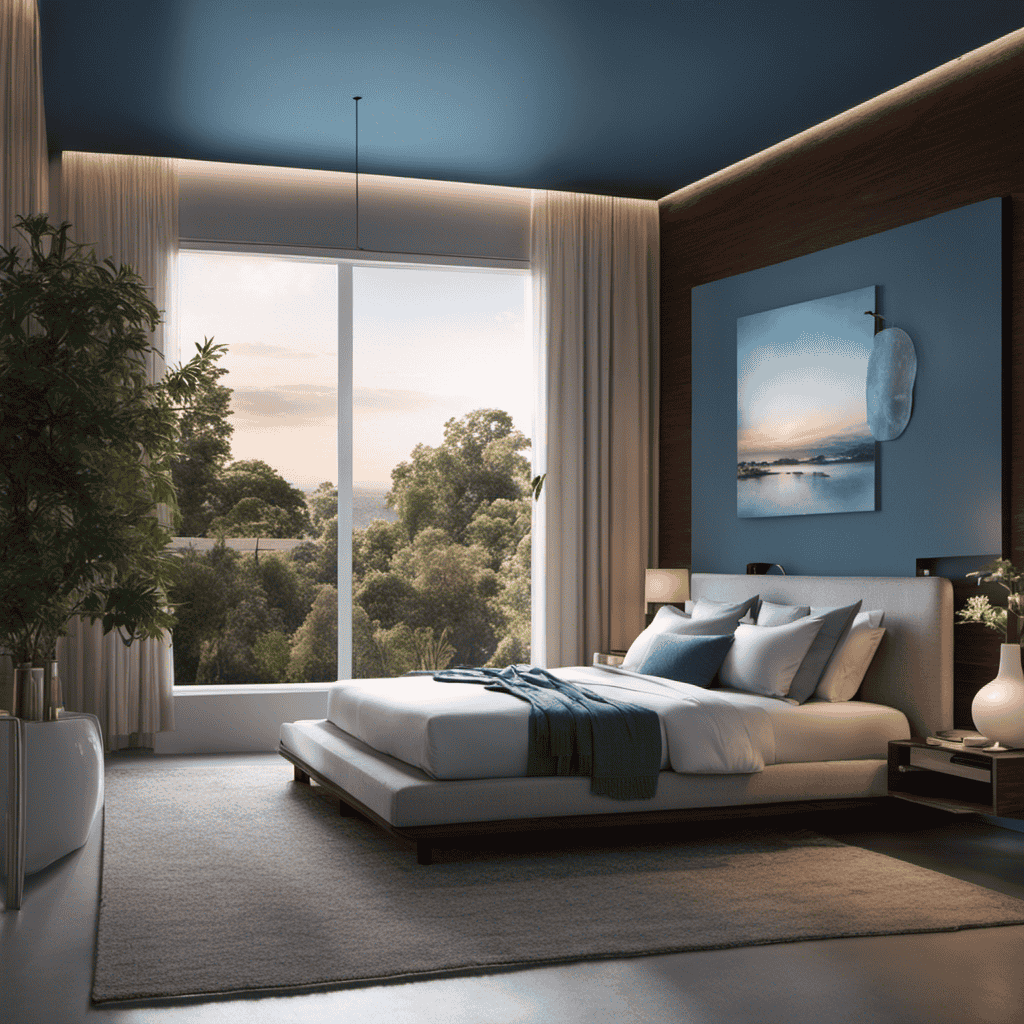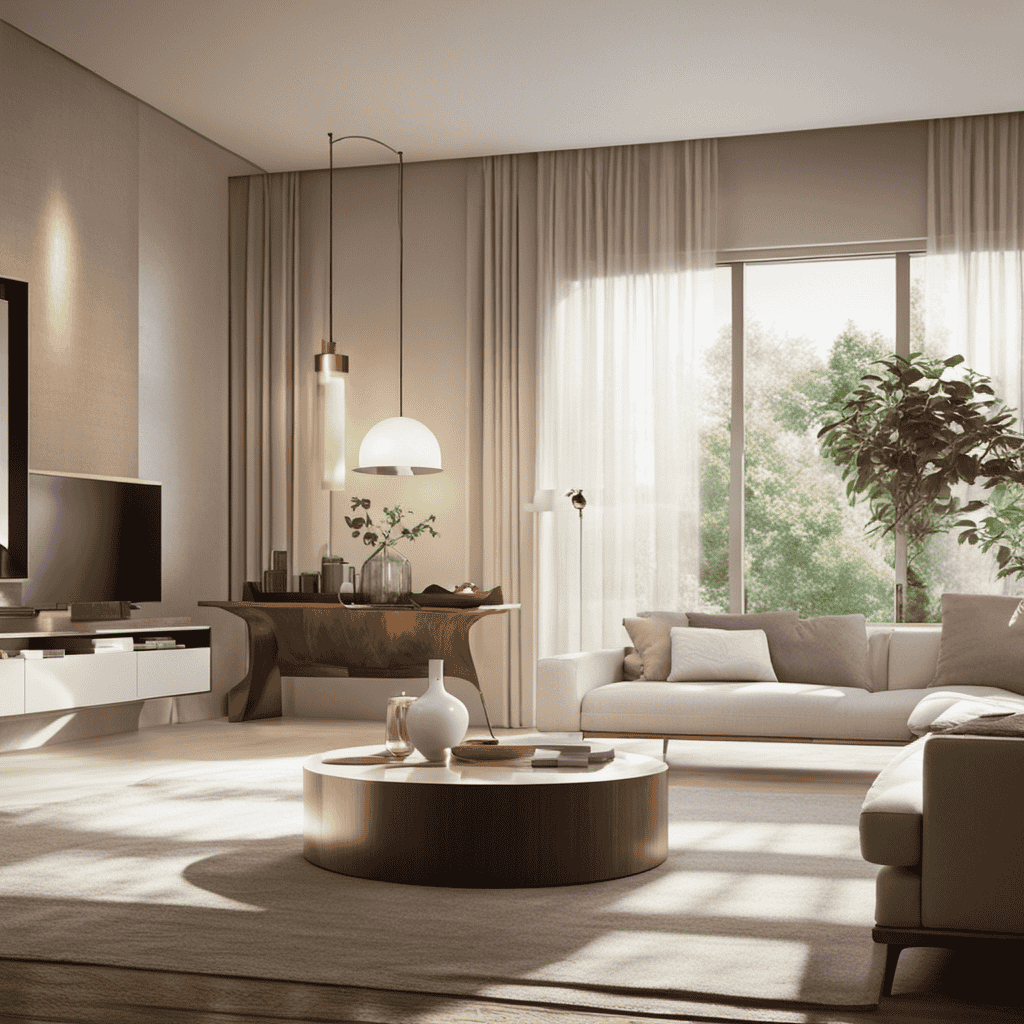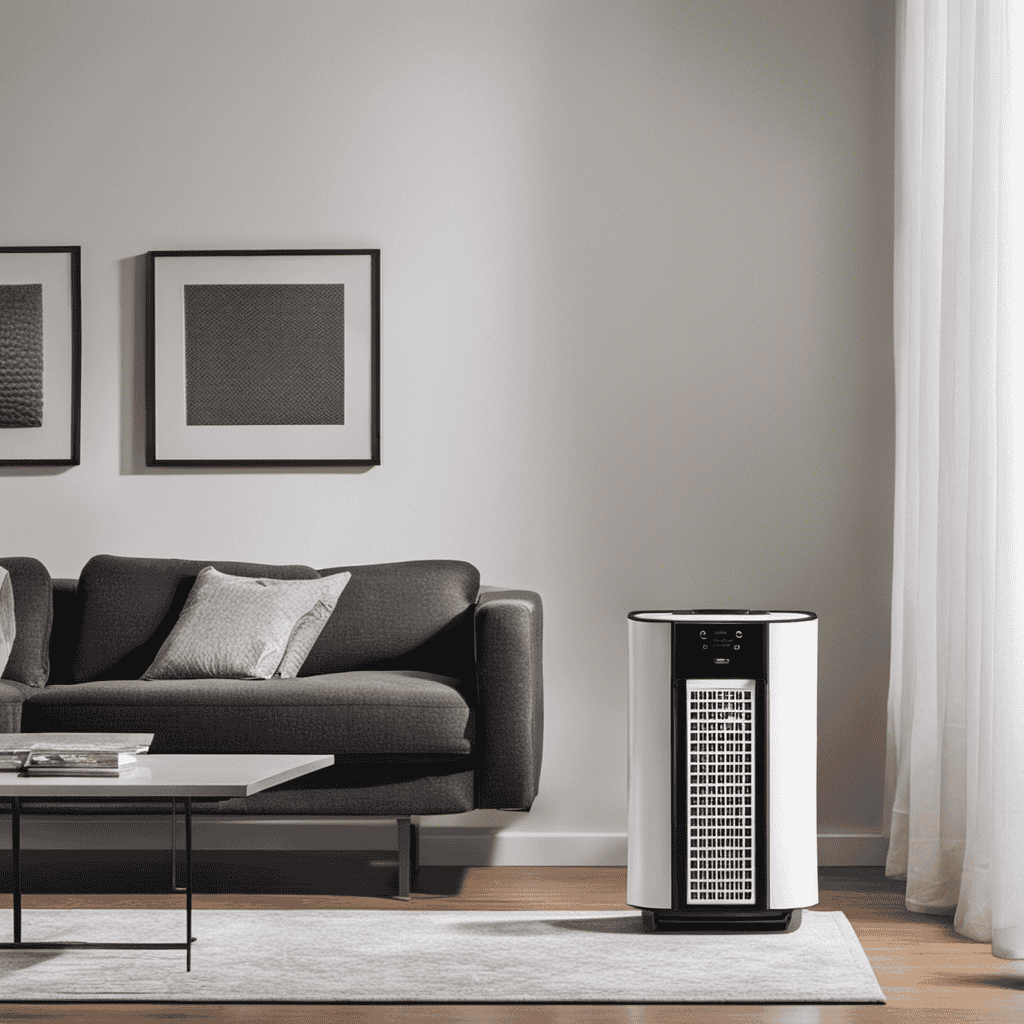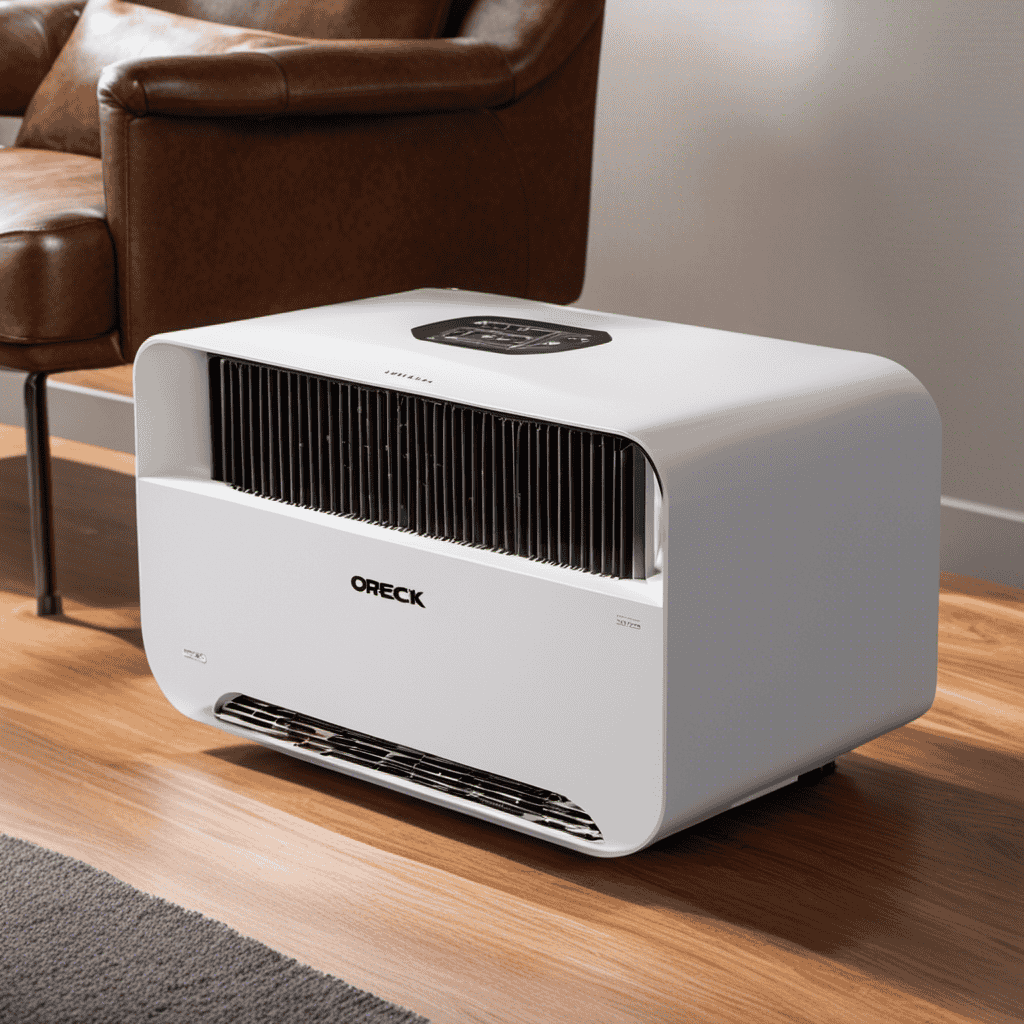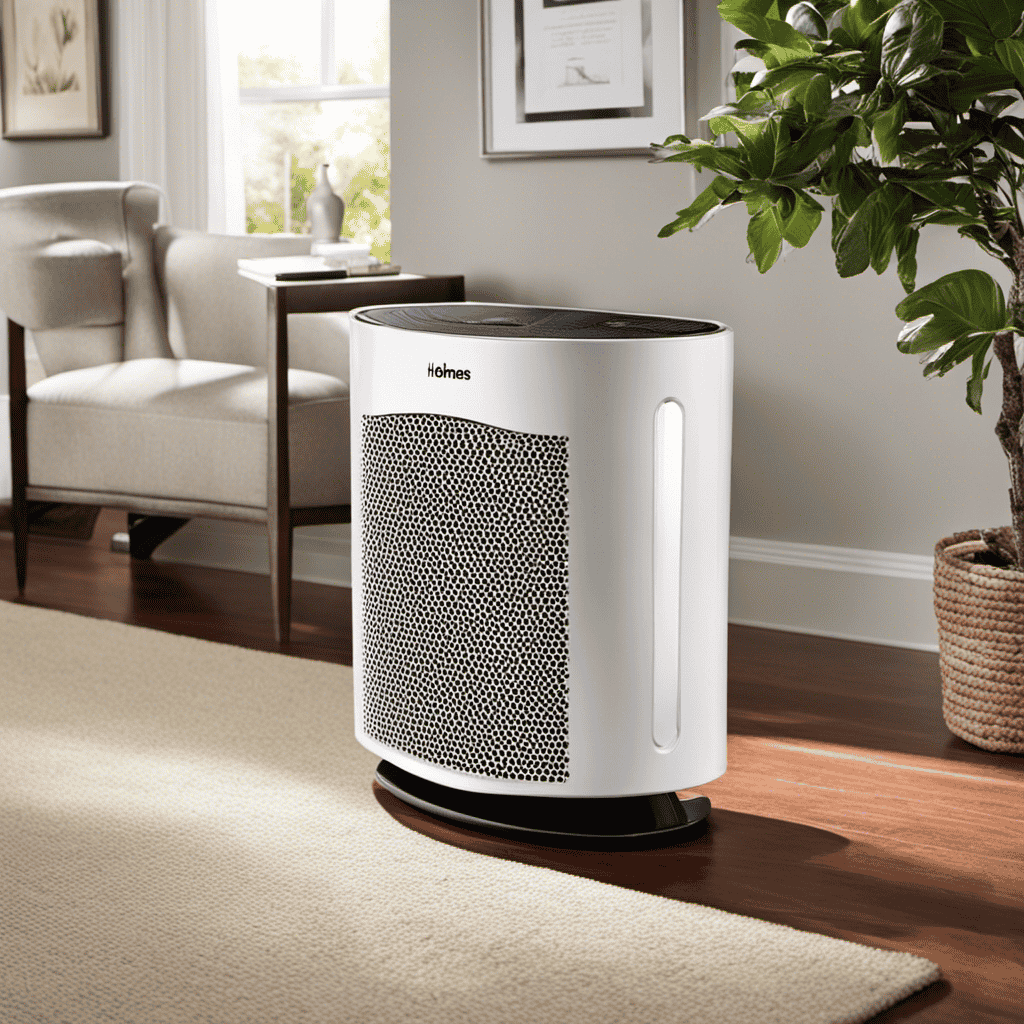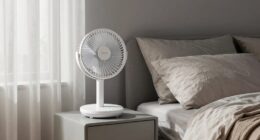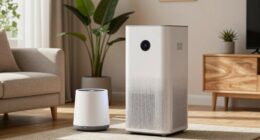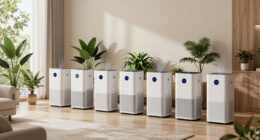I have been utilizing an air purifier for some time now, and I find myself pondering, how long should I keep it running? This is a common question with no definitive answer.
That’s why I’ve done the research and gathered all the information you need to know. In this article, we’ll delve into the recommended operating hours, factors to consider, and best practices for daily use.
So, let’s get started and find out the optimal duration for your air purifier based on your room size and other important factors.
Key Takeaways
- Recommended operating hours for an air purifier are 8-12 hours a day for optimal air quality.
- The duration of air purifier usage should be based on factors such as room size, specific needs, and concerns of individuals, health conditions, and environmental factors.
- Larger rooms may require a more powerful air purifier and regular maintenance for effective air purification.
- Energy-saving tips include setting a timer, regular filter maintenance, optimizing placement, considering energy-efficient models, and using programmable settings.
Recommended Operating Hours
You should leave the air purifier on for about 8-12 hours a day to achieve optimal air quality. This timing allows the air purifier to effectively filter the air in your space, removing pollutants and allergens.
Running the purifier for this duration ensures that you breathe clean and fresh air throughout the day. However, it is important to consider the potential effects on your electricity bill. Depending on the power consumption of your specific air purifier model, running it for 8-12 hours may increase your electricity usage.
To minimize the impact on your bill, you can use the air purifier during times when you are most likely to benefit from it, such as when you are sleeping or during peak pollution hours.
Factors to Consider
When considering the optimal duration for running an air purifier, several factors come into play.
Firstly, the size of the room plays a crucial role in determining the necessary operating hours. Larger rooms may require longer durations to effectively clean the air, while smaller spaces may only need a shorter timeframe.
Additionally, the specific needs and concerns of the individuals using the space should also be taken into consideration. Certain health conditions or environmental factors may require extended use of the air purifier.
Optimal Duration for Air Purifier
The optimal duration for leaving the air purifier on is typically determined by the size of the room and the air quality. It is recommended to run the air purifier continuously in rooms where the air quality is poor or in spaces that are frequently occupied. This ensures that the air is constantly being filtered and cleaned, reducing the presence of pollutants, allergens, and other harmful particles.
In smaller rooms with good air quality, running the air purifier for a few hours a day may be sufficient to maintain a clean and fresh environment. However, it is important to note that the impact on air quality will depend on various factors such as the efficiency of the air purifier, the level of pollutants present, and the frequency of air circulation.
Regular maintenance and filter replacements are also crucial to ensure optimal performance and effectiveness.
Impact of Room Size?
The impact of room size on air purifier effectiveness varies depending on factors such as air circulation and pollutant levels. When considering the room size impact, it’s important to consider the following:
- Air Circulation: A larger room may require a more powerful air purifier to effectively circulate and filter the air.
- Pollutant Levels: If the room has high levels of pollutants, such as allergens or smoke, a larger air purifier or multiple units may be necessary to adequately clean the air.
- Placement: Proper placement of the air purifier is crucial for optimal effectiveness. Ensure that it is positioned in an area where it can effectively capture and filter the air.
- Maintenance: Regular maintenance, such as filter replacements, is essential to maintain the air purifier’s effectiveness.
Considering these factors will help determine the appropriate air purifier for your room size and ensure its effectiveness in improving air quality.
Now let’s delve into the best practices for daily use.
Best Practices for Daily Use
For optimal results, it’s recommended to leave the air purifier on for at least 8 hours a day. This duration allows the air purifier to effectively cycle the air in your room multiple times, removing pollutants and allergens.
However, it is important to note that regular maintenance is necessary to ensure the air purifier continues to function properly. Recommended maintenance includes cleaning or replacing the filters as instructed by the manufacturer, as well as periodically checking and cleaning the vents and fan blades.
Additionally, it is important to monitor the noise level of the air purifier. Excessively loud noise may indicate a problem with the unit and should be addressed promptly.
Now, let’s explore the optimal duration for different room sizes to maximize the benefits of your air purifier.
Optimal Duration for Different Room Sizes
When it comes to air purifiers, the size of the room plays a crucial role in determining its effectiveness. The impact of room size on air purification is a key factor to consider. Larger rooms require more powerful air purifiers to effectively clean the air.
Additionally, the recommended duration of air purifier usage varies based on the size of the room. Larger rooms generally require longer durations to achieve optimal air quality.
Room Size Impact
Room size can affect how long you should leave the air purifier on. The size of the room determines the effectiveness of the air purifier in filtering the air and maintaining good indoor air quality.
Here are some key points to consider:
- The larger the room, the longer the air purifier should be left on to achieve desired results.
- Best air purifiers for larger rooms have higher Clean Air Delivery Rates (CADR), which indicates their ability to filter larger volumes of air.
- Maintenance tips for air purifiers include regularly cleaning or replacing filters, as clogged filters can reduce the efficiency of the purifier.
- It is important to follow the manufacturer’s recommendations regarding the duration of use for specific models to ensure optimal performance and energy efficiency.
Considering these factors, it is essential to choose the right air purifier and operate it for an appropriate duration to effectively clean the air in your specific room size.
Recommended Durations Based on Size
The size of the room determines how long I need to run the air purifier to effectively filter the air and maintain good indoor air quality.
For smaller rooms, such as a bedroom or office, it is generally recommended to run the air purifier for at least 4-6 hours a day. This duration allows the purifier enough time to circulate the air multiple times and remove pollutants effectively.
For larger rooms, like a living room or open-concept space, it is advisable to run the air purifier for longer durations, anywhere from 8-12 hours a day, to ensure optimal air quality.
Continuous use of the air purifier has numerous benefits, including reducing allergens, dust, pet dander, and odors.
It is also important to follow recommended maintenance, such as regularly changing the filters, to ensure the air purifier functions efficiently and effectively.
Energy Efficiency Tips
To save energy, you should consider using your air purifier on a lower setting or for shorter periods of time. This not only reduces your energy consumption but also contributes to a more sustainable lifestyle.
Here are some energy-saving techniques and cost-effective solutions to consider:
-
Use a timer: Set a timer on your air purifier to ensure that it runs only when needed. This helps to minimize energy wastage when you’re not at home or during times when air quality is generally better.
-
Clean or replace filters regularly: Clogged filters can reduce the efficiency of your air purifier, causing it to consume more energy. By cleaning or replacing filters as recommended, you can maintain optimal performance and save energy.
-
Optimize placement: Position your air purifier strategically in the room, away from obstacles such as furniture or curtains. This allows for better air circulation and reduces the need to run the purifier at higher settings.
-
Consider energy-efficient models: When purchasing an air purifier, look for models with energy-saving features such as low power consumption and programmable settings. This can help you save energy and reduce your electricity bills in the long run.
Benefits of Extended Use
You can maximize the benefits of extended use by running your air purifier at a lower setting for longer periods of time, ensuring continuous purification of the air in your space.
Extended use of an air purifier has numerous benefits for your health and well-being. By keeping the device on for longer durations, you allow it to effectively filter out pollutants, allergens, and other harmful particles in the air. This is especially important for individuals with respiratory conditions or allergies.
Additionally, extended use helps maintain a consistently clean and fresh environment, reducing the risk of airborne infections and improving overall air quality.
While some may worry about the energy consumption of running an air purifier for extended periods, modern devices are designed to be energy-efficient, minimizing any impact on your electricity bill.
Potential Risks of Leaving It on Too Long
Leaving an air purifier on for an extended period may lead to increased energy consumption. It is important to be aware of the potential health concerns that may arise from prolonged use. While air purifiers provide numerous benefits, there are risks associated with leaving them on for too long. Here are some risks of extended use to keep in mind:
- Indoor air pollution may not be effectively reduced if the air purifier is not properly maintained.
- Continuous exposure to ozone emitted by certain types of air purifiers can cause respiratory irritation and other health issues.
- Overuse of air purifiers may lead to increased noise levels, which can disrupt sleep and affect overall well-being.
- Extended use of air purifiers without proper ventilation may result in increased humidity levels, creating an ideal breeding ground for mold and bacteria.
Considering these risks, it is essential to determine the ideal runtime for your air purifier to ensure optimal performance while minimizing potential health concerns.
How to Determine the Ideal Runtime
Determining the ideal runtime for your air purifier can be achieved by considering factors such as room size, air quality, and the manufacturer’s recommendations.
To start, you need to assess the size of the room where the air purifier will be placed. Larger rooms may require longer runtime to effectively clean the air.
Additionally, monitoring air quality is crucial in determining the ideal runtime. If you live in an area with poor air quality or have specific allergens present, you may need to run the purifier for longer periods.
Lastly, it is essential to follow the manufacturer’s recommendations. They have designed the purifier with specific features and filters that are optimized for certain runtime durations.
Adjusting Usage Based on Air Quality
Adjusting the runtime of your air purifier based on the current air quality is essential for maintaining clean and healthy indoor air. By monitoring the air quality, you can customize the schedule of your air purifier to ensure optimal performance.
Here are some key points to consider:
-
Regularly check the air quality: Use a reliable air quality monitor to keep track of the pollutant levels in your home. This will help you identify when it’s necessary to adjust the runtime of your air purifier.
-
Adjust the schedule accordingly: If the air quality is poor, consider running your air purifier for longer periods of time. On the other hand, if the air quality is good, you may reduce the runtime to save energy.
-
Consider peak pollution times: If you live in an area with high pollution levels during certain times of the day, it may be beneficial to increase the runtime of your air purifier during those periods.
-
Evaluate the effectiveness: Regularly assess the impact of adjusting the runtime on the air quality in your home. This will help you determine the most effective schedule for your air purifier.
What Is the Recommended Duration for Air Purifier Usage?
Wondering how long to leave the air purifier on? The recommended duration for air purifier usage varies depending on factors like air quality, room size, and personal preferences. In general, it is suggested to run the air purifier continuously to maintain optimal air quality. However, for energy conservation, you can consider running it for at least 6-8 hours daily or as needed.
Frequently Asked Questions
Can Leaving an Air Purifier on for Too Long Have Any Negative Effects on the Air Quality in My Home?
Leaving an air purifier on for too long can negatively impact indoor air quality. Prolonged use may lead to a decrease in pollutant removal efficiency and potentially increase ozone levels. However, individuals with respiratory conditions can benefit from using air purifiers.
Is It Safe to Leave an Air Purifier on Overnight While I Sleep?
It is safe to leave an air purifier on overnight while you sleep. The energy consumption typically ranges from 50-200 watts, and the noise level is usually tolerable for light sleepers.
Can Leaving an Air Purifier on for Extended Periods of Time Increase My Electricity Bill Significantly?
Leaving an air purifier on for extended periods of time can lead to a significant increase in electricity consumption. However, it also has a positive impact on air quality, making it worth considering the trade-off.
How Often Should I Clean or Replace the Filters in My Air Purifier to Maintain Its Effectiveness?
To maintain the effectiveness of my air purifier, I should clean or replace its filters regularly. This ensures that it continues to filter out pollutants efficiently. It is necessary to turn off the air purifier when I’m not at home to conserve energy.
Are There Any Specific Health Concerns or Risks Associated With Using an Air Purifier for Long Durations, Especially for Individuals With Respiratory Conditions?
Using an air purifier for long durations may have health concerns for individuals with respiratory conditions. It’s important to consider noise levels and effectiveness to ensure optimal air quality without compromising well-being.
Conclusion
In conclusion, determining the ideal runtime for your air purifier is crucial for optimal air quality. By considering factors such as room size, air quality, and energy efficiency, you can make informed decisions about how long to leave your purifier on.
Remember to adjust usage based on air quality and follow best practices for daily use. While extended use can offer additional benefits, be mindful of potential risks.
So, take control of your indoor environment and breathe in the fresh, purified air you deserve.
